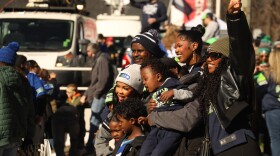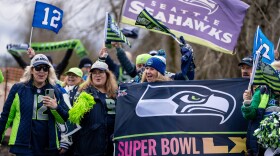There’s a small plaque on the side of the brick grandstand at Seattle’s Lower Woodland Park.
It reads: “Dedicated in honor of Mr. Baseball, Leo H. Lassen.”
It’s one of several nicknames bestowed upon Lassen during his lengthy career as a Seattle baseball broadcaster. Others include "The Great Gabbo" and "The Voice." The monikers spoke to his stature among fans.
As part of KNKX's ongoing series What’s in a Name, I set forth to find out why these sports fields in North Seattle are named for Lassen, and why — more than 60 years after he broadcast his last game — he still evokes strong memories among baseball fans.
‘A transistor radio under my pillow’
On a Saturday at Lower Woodland Park, across the street from Green Lake, birds were chirping and the shouts of children playing baseball and softball filled the air.
“My grandson's playing somewhere. I don't think they've showed up yet,” said Gary Burback, who had arrived before the baseball game started. As he waited, we started to chat.
I came here hoping to find someone who listened to Leo Lassen call baseball games way back when.

Before Major League Baseball arrived in Seattle, the highest level of professional baseball in this part of the country was the Pacific Coast League. And the hometown team was the Seattle Rainiers.
Burback said he and his family would attend a couple Rainiers games a year. The rest of the time, he tuned in from his bedroom.
“I was pretty young, and a lot of the games were late at night. So it was the transistor radio under my pillow,” Burback said. “And [Lassen’s] call for the home run was 'back back back back and it’s over!'"
Burback’s spot-on Lassen impersonation was fairly common around Seattle, with fans and players imitating his calls and phrases.
'People were absolutely amazed'
Another signature, Burback recalled, was Lassen’s ability to vividly describe road games while sitting in a radio studio in Seattle, with only sparse descriptions being fed to him by telegraph from a distant ballpark.
“I think a lot of away games they’d call by ticker tape or something like that,” Burback said. “It was interesting. It was high-tech back then.”
This was a common practice before baseball announcers began regularly traveling with teams. But, as Pacific Northwest sports historian David Eskenazi said, few did it better than Lassen.
“With his intricate knowledge of the game, and also his familiarity with the players and teams — having seen them so much at home games — he could recreate a game,” Eskenazi said. “People were absolutely amazed that he wasn’t on the road with the team.”
Lassen became a household name in Seattle, but he wasn't a radio broadcaster by trade. After graduating from Lincoln High School, Lassen was a newspaper writer and publicist. He was already on the payroll for the baseball franchise that would become the Rainiers, and he called their games from the 1930s until 1960.
“He knew the rule book cover to cover — the finer points of the game and the intricacies — and he could express it in a way that made a richer experience for fans,” Eskenazi said.
Mr. Baseball
Lassen acquired several nicknames over his long tenure on the air in Seattle. Among them was the "Great Gabbo." I asked Eskenazi how that one came about.
“Just gab. The word 'gab.' That rapid-fire, staccato delivery that he had,” Eskenazi said. “I mean, he could just talk, talk, talk, but he was very adept at doing it. And it was all great content. There were no wasted words.”
Other nicknames included "Mr. Baseball" and “The Voice."
“You don't get the nickname 'The Voice' unless you're highly lauded,” Eskenazi said. “He just built a great base of baseball fans here in Seattle, and that becomes a generational thing."

Lassen’s tenure ended before the 1961 season. The team had new owners, and the two sides couldn’t reach a contract agreement.
After that, Lassen receded from public life. He lived alone in Wallingford, took care of his aging mother for a time and tended to his rose garden. He rarely left his house. Legendary sportswriter Royal Brougham lamented that Lassen had become a lonely man, "a discouraged, disillusioned, almost bitter hermit."
"He never entered the ballpark again. He declined invitations to attend sports functions," Brougham wrote. "Neighbors said his only appearance was a daily trip to the corner grocery store."
‘He made baseball fans more knowledgeable’
Despite those years of isolation, Lassen’s legacy had already been forged by three decades on the radio, serving as a daily listening companion for many. In Lassen’s obituary, longtime Seattle Times sports editor Vince O’Keefe said he was perhaps the best known figure in Seattle baseball history.
Lassen set the stage for Seattle to become a major league town, with fans who knew the baseball rulebook, the game’s strategy, and, as Eskenazi pointed out, who were excited to buy tickets.

“He really built a base here in Seattle and the Pacific Northwest,” Eskenazi said. “He made baseball fans more knowledgeable. Leo was not only ‘must-listen’ listening when he broadcast games, but he would promote the sport quite a bit, and tell people to go to the ballpark, so he was responsible for a lot of the attendance as well.”
In recognition of that contribution, the City of Seattle in 2002 named the fields at Lower Woodland Park for Lassen and honored him with a plaque — one of the few lasting physical reminders of the "Great Gabbo," "The Voice" and "Mr. Baseball."







